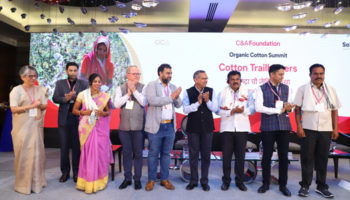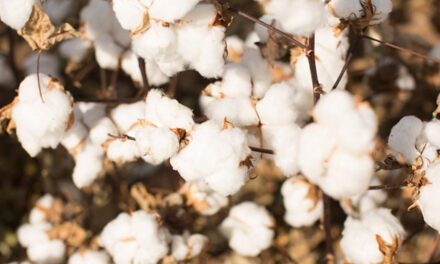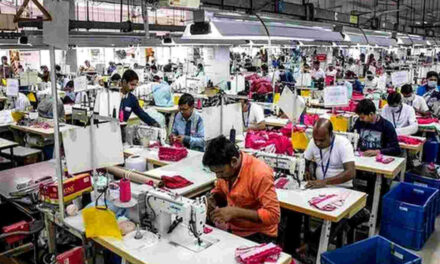 Over 150 delegates from India and other parts of the world, representing government, the apparel industry, academia, research institutions, civil society and farmer groups, are in Nagpur recently at the 2nd edition of Cotton Trailblazers. Their main goal is to build a roadmap for the organic cotton sector in India, establishing Maharashtra as a key hub for organic cotton. The convening, co-hosted by C&A Foundation in collaboration with Solidaridad Asia and Organic Cotton Accelerator (OCA), celebrated India’s leadership in global organic cotton production and turned the spotlight on organic cotton farmers.
Over 150 delegates from India and other parts of the world, representing government, the apparel industry, academia, research institutions, civil society and farmer groups, are in Nagpur recently at the 2nd edition of Cotton Trailblazers. Their main goal is to build a roadmap for the organic cotton sector in India, establishing Maharashtra as a key hub for organic cotton. The convening, co-hosted by C&A Foundation in collaboration with Solidaridad Asia and Organic Cotton Accelerator (OCA), celebrated India’s leadership in global organic cotton production and turned the spotlight on organic cotton farmers.
Cotton Trailblazers brings together key players to deliberate on the challenges facing the organic cotton sector and to look for solutions through collaborative efforts that create value for all – from farmers to consumers.
Speaking on the occasion, Anita Chester, Head of Sustainable Raw Materials, C&A Foundation, said “India continues to dominate the organic cotton production across the globe, and it has been estimated that India’s total organic fibre production will continue to grow over the next few years. This highlights the enormous potential India has in demonstrating organic transformation and effectively work together towards creating a sustainable fashion industry.”
The stakeholders unanimously agreed that organic cotton is positioned to ‘take off’ in Maharashtra. The State was a pioneer in the organic transformation; yet today, only 11 percent of India’s total organic cotton supply comes from Maharashtra. A revival in the State can benefit the farmers by reducing cultivation costs in the input phase and lead to a decrease the overall debt, as well as stimulate the soil’s natural balance.
“I have observed that the traditional practices that had been very common in the past, stopped with the introduction of BT cotton. This led to a digression to chemical farming. With the organic cotton initiative in our State, practices such as making organic compost, are emerging again and have proven to be very helpful for us as they are chemical-free and do not require any extra expenditure,” says, Roopraj Wamanro Milmile, a Farmer from Yavatmal.
C&A Foundation and Solidaridad Asia have already incubated various local solutions that have been catalyst for the adoption of organic practises in the State, with an aim to reach 15,000 farmers. The organic cotton programme was also complemented with additional efforts by Solidaridad Asia on addressing the water stress challenge in the region by promoting micro-irrigation and rainwater management solutions covering 30,000 farmers. Dr. Shatadru Chattopadhyay, Managing Director, Solidaridad Asia said, “We, along with our partners are creating a prosperous cotton sector by using sustainable production methods that have contributed to improved water use efficiency, worker health and safety and much-reduced water pollution levels.”
After setting the context for the day’s discussions on making a business case for organic cotton, the speakers deliberated on how local handloom enterprises can engage directly with farmers of their own state and pay them a premium price for cotton in-transition towards organic. The dialogue focused on farmers and big brands, and the business models that have the potential to scale up, along with the challenges and benefits of such business alliances. Participants shed light on policy enablers that would help strengthen the organic cotton sector. A need for traceability in the organic supply chain and importance of sustainability in the fashion industry was emphasised.
“The transformation has already begun, civil society organisations are ready to act, and farmers have taken the first steps on the route back to organic farming. Massive untapped sustainable potential is still awaiting realisation, so let’s all get started and embrace the revival of organic cotton in Maharashtra,” added Chester.
Av, kv, avbd , kvbd globe
Teijin launches light, soft and tear-resistant fabric
Teijin Frontier Co., Ltd., the Teijin Group’s fibres and products converting company, announced that it has launched a lightweight, tear-resistant and flat-surfaced fabric that also is soft, eco-friendly and abrasion-resistant, making it ideal for sportswear. Teijin Frontier will promote its new fabric as a key product for 2021 spring / summer sports and outdoor collections, targeting sales for a wide range of applications.
Teijin Frontier envisions its new fabric finding diverse applications in high-function wear, such as sports and outdoor wear, fashionwear, school and corporate uniforms and more. The company is targeting annual sales of 400,000m by the fiscal year ending in March 2023.
Features:
• Appearance and texture: Flat surface and soft handfeel thanks to uniform thickness of thread
• Lightweight: Achieved by using thinner yarn
• Durability:
Highly tear-resistant due to PASMO® high-tenacity polyester yarn
Excellent abrasion-resistance and anti-snagging* (*Lack of protruding fibers or yarns that can catch on other surfaces/objects) due to flat, even surface
• Versatility: Diverse fabric designs possible by changing arrangement of constituent yarns and by mixing with functional yarns
• Eco-friendliness: Eco-friendly designs by mixing with recycled polyester
Technical Overview
• Spinning: Technology for making thin, high-tenacity polyester fibre for thin, lightweight and durable fabrics
• Weaving:
Structure optimization, yarn arrangement and density setting result in flat, even appearance
PASMO® high-tenacity polyester can be mixed with various high-performance yarns for various purposes
• Dyeing: Dyeing and finishing processes and thorough production control to achieve excellent tear, abrasion and snag resistance
With the appearance of diverse fashion styles integrating sports, outdoors and lifestyles in recent years, demands have grown need for sports apparel that combine superior functionality with new appearances and textures.
Woven rip-stop fabric in which thick yarns are arranged in a checkered pattern is commonly used as a lightweight, tear-resistant fabric for sports and outdoor wear. Current fabrics, however, have various problems in terms of hard textures, uneven surfaces in checked patterns, sometimes resulting in snagging, and low resistance to abrasion. The market has been demanding new design methods to produce rip-stop fabrics offering distinctive functions, appearances and textures.
In response, Teijin Frontier has adopted a thin, high-tenacity polyester yarn and applied innovative yarn arrangement and weaving density to produce a lightweight and highly tear-resistant fabric that is ideally suited for sports and outdoor wear with its flat, even surface, soft texture and high resistance to abrasion and snagging.













